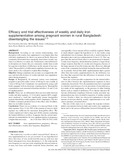| dc.contributor.author | Ekstrom, Eva-Charlotte | |
| dc.contributor.author | Hyder, S.M. Ziauddin | |
| dc.contributor.author | Chowdhury, AMR | |
| dc.contributor.author | Chowdhury, Sadia A. | |
| dc.contributor.author | Lonnerdal, Bo | |
| dc.contributor.author | Habicht, Jean-Pierre | |
| dc.contributor.author | Persson, Lars Ake | |
| dc.date.accessioned | 2019-12-19T06:31:08Z | |
| dc.date.available | 2019-12-19T06:31:08Z | |
| dc.date.issued | 2002 | |
| dc.identifier.citation | Ekstrom, E.-C., Hyder, S. M. Z., Chowdhury, A., Chowdhury, S. A., Lonnerdal, B., Habicht, J.-P., & Persson, L. A. (2002). Efficacy and trial effectiveness of weekly and daily iron supplementation among pregnant women in rural Bangladesh: disentangling the issues. The American Journal of Clinical Nutrition, 76(6), 1392–1400. doi:https://doi.org/10.1093/ajcn/76.6.1392 | en_US |
| dc.identifier.uri | http://hdl.handle.net/10361/13322 | |
| dc.description.abstract | BACKGROUND:
According to our current understanding, iron absorption with weekly iron supplements is not higher than that with daily supplements (ie, there is no mucosal block). However, community-based trials have repeatedly shown that a weekly regimen is as effective as a daily one. Furthermore, when differences in absorption are found, they are commonly smaller than would be expected on the basis of differences in the amount of iron provided. The possibility of differential compliance between the regimens needs to be evaluated to explain these findings.
OBJECTIVE:
Taking compliance into account, we compared the efficacy and trial effectiveness of weekly and daily iron supplementation during pregnancy.
DESIGN:
In Bangladesh, 50 antenatal centers were randomly assigned to prescribe either 2 doses of 60 mg Fe once weekly or 1 dose of 60 mg Fe/d. Compliance was monitored by using a pill bottle equipped with an electronic counting device. Hemoglobin concentrations were measured at baseline and after 4, 8, and 12 wk of supplementation.
RESULTS:
There was no differential effect per iron tablet between weekly and daily regimens. A 12-wk daily regimen (68% compliance) produced a small but significantly greater hemoglobin response than did the weekly regimen (104% compliance). The first 20 tablets consumed produced most of the effect; after 40 tablets, there was no further response.
CONCLUSIONS:
There was no evidence of a mucosal block in the daily regimen. Over 12 wk, 50% of the amount of iron in a daily regimen was sufficient for maximum hemoglobin effect. The weekly regimen provided a large part of this amount, explaining the limited difference in effect. It appears that the current international recommendation for iron supplementation in pregnancy is higher than necessary. | en_US |
| dc.language.iso | en | en_US |
| dc.publisher | The American Journal of Clinical Nutrition | en_US |
| dc.subject | Iron supplementation | en_US |
| dc.subject | Pregnancy | en_US |
| dc.subject | Efficacy | en_US |
| dc.subject | Bangladesh | en_US |
| dc.subject | Weekly dose frequency | en_US |
| dc.title | Efficacy and trial effectiveness of weekly and daily iron supplementation among pregnant women in rural Bangladesh: disentangling the issues | en_US |
| dc.type | Article | en_US |

